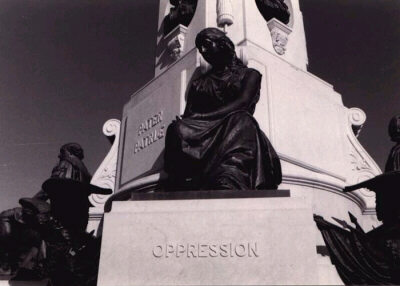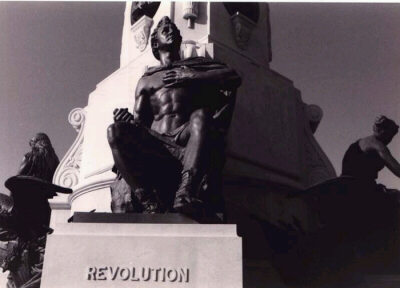 I am writing in response to your discussion of contemporary Anglo-American geopolitics and its relation to “truth” in your recent Nobel Lecture, “Art, Truth, & Politics." More particularly I want to begin to explain why many of your natural allies -- people who admire your work, see you as an ally in the ongoing fight for truth, integrity, and downright accountability in global democratic politics, and draw similar conclusions to yours about current U.S. foreign policy -- found your lecture unhelpful and, in places, misguided.
I am writing in response to your discussion of contemporary Anglo-American geopolitics and its relation to “truth” in your recent Nobel Lecture, “Art, Truth, & Politics." More particularly I want to begin to explain why many of your natural allies -- people who admire your work, see you as an ally in the ongoing fight for truth, integrity, and downright accountability in global democratic politics, and draw similar conclusions to yours about current U.S. foreign policy -- found your lecture unhelpful and, in places, misguided.
The first problem with your attack on the current situation is that you offer no alternative -- either to the U.N. or to the way that the United States has exercised its de facto leadership of the community of nations. The exercise of military and political power is always, and necessarily, marked by compromises. Today's United Nations, although it seems deeply flawed, is an attempt at structuring those compromises in meaningful political time, and with the possibility for the different sides to be heard. What is your proposed alternative? While perhaps it is the place of an artist merely to comment on the present, rather than prescribe policies for the future, surely an immediate response to your critiques would be along the lines of Churchill’s comment about democracy – it’s “the worst form of government, except for all those other forms that have been tried from time to time.”
It is no accident that a writer who has spent as much time and energy on human rights as yourself should win the Nobel Prize for Literature this year, when those rights seem deeply compromised by those members of the world community who nominally defend them. Although I mean in no way to diminish your writing, your work for human rights in the past decades is as much the context of the prize as your considerable dramatic oeuvre. Even given these contexts the content of your speech was far from obvious – you had been given a platform but your decision to use it was brave. Yet without specifying any alternatives, or even reforms, your critics are given ample grounds to dismiss you (and, by extension, those of us who share your views) as overly critical and idealistic.
The second problem with your lecture is its lack of nuance with respect to its targets. At the start of Moses and Monotheism (1940) Sigmund Freud discusses the dangers of confronting “supposed national interests” to “deny a people the man whom it praises as the greatest of its sons.” Although he purportedly is “denying” the Jews' Moses (“the greatest of its sons”) by claiming that he was, in fact, an Egyptian, Freud’s analysis runs exactly counter to the essentialist Aryan views of the Nazis and their black-haired, brown-eyed leader. At once arguing against the Jews' enemies by undermining the Jews' own claims, Freud was as steadfast as yourself in his defence of truth. “No consideration,” he states in his opening paragraph “will move me to set aside truth in favour of supposed national interests.”
 Yet whereas Freud never separated his subtle, pioneering work in psychoanalysis with from political concerns, you seem to be two different people -- a dichotomy you actually seem to support, as we will see below. You too set aside your own national interests as a subject of the United Kingdom, in order to speak what your perceive to be the truth, while attacking Bush and Blair, who are, in political terms, the greatest sons of the current world order. However, whereas Freud deployed his talents as an analyst to suggest a deeply critical alternative analysis of history that applied to his own time, there seems to be an explicit disjunction between your own plays – your area of excellence – and your treatment of contemporary events. As a playwright used to fleshing out multiple characters in your plays and discovering, by your own account, their voices as you wrote them, your Nobel Lecture was surprisingly univocal. Your disingenuous dismissal of the United States in its entirety ignores the extremely heterogeneous societies and histories in the United States, ones that have produced and inspired art and movements for peace, democracy, and liberation across the world.
Yet whereas Freud never separated his subtle, pioneering work in psychoanalysis with from political concerns, you seem to be two different people -- a dichotomy you actually seem to support, as we will see below. You too set aside your own national interests as a subject of the United Kingdom, in order to speak what your perceive to be the truth, while attacking Bush and Blair, who are, in political terms, the greatest sons of the current world order. However, whereas Freud deployed his talents as an analyst to suggest a deeply critical alternative analysis of history that applied to his own time, there seems to be an explicit disjunction between your own plays – your area of excellence – and your treatment of contemporary events. As a playwright used to fleshing out multiple characters in your plays and discovering, by your own account, their voices as you wrote them, your Nobel Lecture was surprisingly univocal. Your disingenuous dismissal of the United States in its entirety ignores the extremely heterogeneous societies and histories in the United States, ones that have produced and inspired art and movements for peace, democracy, and liberation across the world.
Both the United Kingdom and the United States have much to be proud of, but also much to regret, in their histories, cultures, attitudes, and actions. Moreover, as you note about truth and falsehood, negative and positive exist simultaneously, even paradoxically in symbiosis: one does not "outweigh" the other, nor does the negative "undermine" the positive. This is true not only in cultural terms but even in terms of power. For example, some of England's and the United States' most regrettable actions have come about as a result of the great power that these two English-speaking nations have had at their disposal over the past two centuries -- yet some of their greatest achievements have as well; for example, helping to bring about real democratic revolutions, from France to, more recently, the Ukraine. By dismissing the U.S. as entirely a power-hungry nation you put on the defensive the majority of its citizens who intend it to be, rather, a light unto the nations. Furthermore, in painting the nation with one colour in that way, you alienate exactly those constituencies you aim to mobilize – those who feel aggrieved at the actions carried out in their name.



A Parable after my hard drive crashed
Zalman Schachter-Shalomi
Christmas in Jerusalem
Jay Michaelson
Carobs
Elisha Porat
Dear Mr. Pinter
Dan Friedman
The Nuclear Physicist Gives his Son a Haircut
Hanan Harchol
Brodsky Begins, Part Two
Adam Mansbach
Archive
Our 870 Back Pages
Zeek in Print
Subscribe now!

About Zeek
Mailing List
Contact Us
Subscribe
Tech Support
Links

From previous issues:
Meditation and Sensuality
sha'atnez
Deep, Jewish Pain
Jay Michaelson
Abraham Mezrich
Andrea Liu